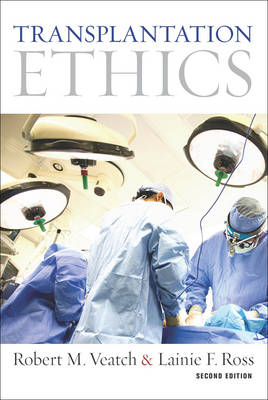
Transplantation Ethics
Georgetown University Press (Verlag)
978-1-62616-167-2 (ISBN)
Although the history of organ transplant has its roots in ancient Christian mythology, it is only in the past fifty years that body parts from a dead person have successfully been procured and transplanted into a living person. After fourteen years, the three main issues that Robert Veatch first outlined in his seminal study Transplantation Ethics still remain: deciding when human beings are dead; deciding when it is ethical to procure organs; and deciding how to allocate organs, once procured. However, much has changed. Enormous strides have been made in immunosuppression. Alternatives to the donation model are debated much more openly - living donors are used more widely and hand and face transplants have become more common, raising issues of personal identity. In this second edition of Transplantation Ethics, coauthored by Lainie F Ross, transplant professionals and advocates will find a comprehensive update of this critical work on transplantation policies.
Robert M. Veatch is Professor of Medical Ethics at the Kennedy Institute of Ethics, Georgetown University. He is a member of the Board of Directors of the Washington Regional Transplant Community as well as the Ethics Committee and the Vascular Composite Allografts Committee of the United Network for Organ Sharing. He has received the Lifetime Achievement Award from the American Society of Bioethics and Humanities, the Henry Knowles Beecher Award from the Hastings Center, and gave the Gifford Lectures at the University of Edinburgh. He is the author of fifty books including The Basics of Bioethics and Case Studies in Biomedical Ethics. Lainie F. Ross is the Carolyn & Matthew Bucksbaum Professor of Clinical Medical Ethics at the University of Chicago; professor in the departments of Pediatrics, Medicine, Surgery and the College; associate director of the MacLean Center for Clinical Medical Ethics; and codirector of the Institute for Translational Medicine. She is a recipient of the Patricia Price Brown Prize in Biomedical Ethics from the Oklahoma Health Sciences University and a John Simon Guggenheim Memorial Foundation Fellowship. She is the author of two books, Children, Families and Health Care Decision-Making and Children in Medical Research: Access versus Protection.
Preface 1. Religious and Cultural Perspectives 2. An Ethical Framework: General Theories of Ethics PART I: DEFINING DEATH3. The Dead Donor Rule and the Concept of Death 4. The Whole-Brain Concept of Death 5. The Circulatory, or Somatic, Concept of Death 6. The Higher-Brain Concept of Death 7. The Conscience Clause: How Much Individual Choice Can Our Society Tolerate8. Crafting a New Definition-of-Death Law PART II: PROCURING ORGANS9. The Donation Model 10. Routine Salvaging and Presumed Consent 11. Markets for Organs 12. Live-Donor Transplants 13. High-Risk Donors 14. Xenotransplants: Using Organs from Animals 15. The Media's Impact on Transplants and Directed Donation PART III: ALLOCATING ORGANS16. The Roles of the Clinician and the Public 17. A General Moral Theory of Organ Allocation 18. Voluntary Risks and Allocation: Does the Alcoholic Deserve a New Liver? 19. Multi-Organ, Split-Organ, and Repeat Transplants 20. The Role of Age in Allocation 21. The Role of Status: The Cases of Mickey Mantle, Robert Casey, Steve Jobs, andDick Cheney22. Geography and Other Causes of Allocation Disparities 23. Socially Directed Donation: Restricting Donation by Social Group 24. Elective Organ Transplantation 25. Vascularized Composite Allografts: Hand, Face, and Uterine Transplants Index
| Verlagsort | Washington, DC |
|---|---|
| Sprache | englisch |
| Maße | 178 x 254 mm |
| Gewicht | 816 g |
| Themenwelt | Literatur ► Märchen / Sagen |
| Medizin / Pharmazie ► Medizinische Fachgebiete ► Chirurgie | |
| Studium ► Querschnittsbereiche ► Geschichte / Ethik der Medizin | |
| ISBN-10 | 1-62616-167-4 / 1626161674 |
| ISBN-13 | 978-1-62616-167-2 / 9781626161672 |
| Zustand | Neuware |
| Haben Sie eine Frage zum Produkt? |
aus dem Bereich


